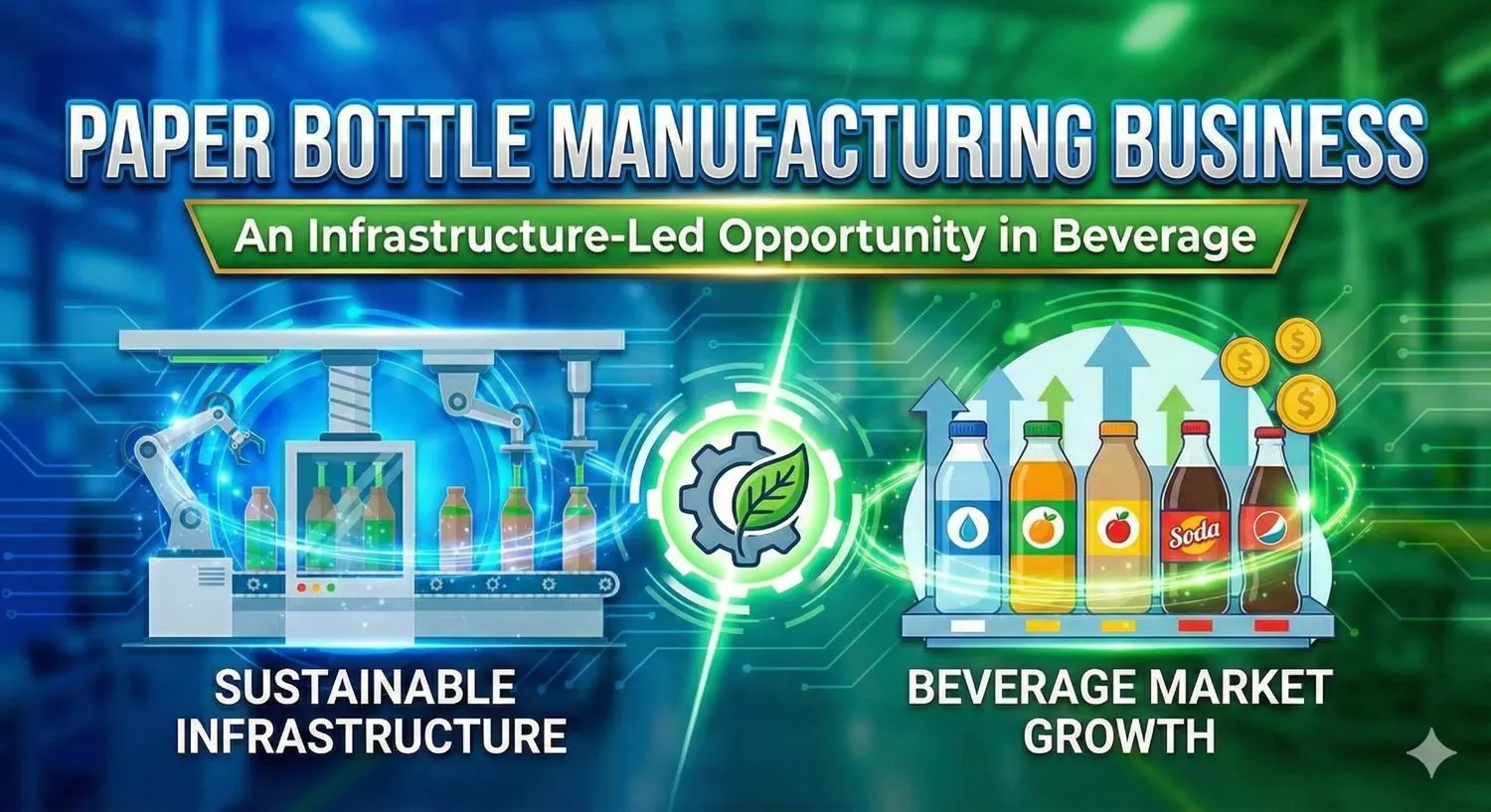Aluminium foil is a key industrial product with a wide range of applications in packaging, insulation, electronics, and household items. With the global demand for flexible and sustainable packaging materials increasing, setting up an aluminium foil mill presents a lucrative business opportunity. Entrepreneurs and investors looking to enter the manufacturing sector can find substantial returns from aluminium foil production, particularly when paired with strategic planning, technological advancement, and market analysis. This guide provides a comprehensive overview of setting up an aluminium foil mill, including investment requirements, process technology, market scope, and profitability insights.
Contents
- 1 Understanding the Aluminium Foil Mill Industry
- 1.1 Market Potential
- 1.2 Investment Requirements
- 1.3 Raw Material and Sourcing
- 1.4 Manufacturing Process Overview
- 1.5 Required Machinery and Equipment
- 1.6 Legal Compliance and Licensing
- 1.7 Location and Infrastructure
- 1.8 Skilled Manpower and Staffing
- 1.9 Profit Margins and Revenue Potential
- 1.10 Opportunities for Growth and Diversification
- 1.11 Sustainability and Environmental Responsibility
- 1.12 Challenges in the Industry
- 1.13 Conclusion
Understanding the Aluminium Foil Mill Industry
The aluminium foil industry has witnessed exponential growth over the past two decades. The material’s versatility, light weight, recyclability, and superior barrier properties make it a favored choice across multiple industries. An aluminium foil mill processes raw aluminium into thin foil rolls used in packaging, pharmaceuticals, food preservation, electronics shielding, and more.
Market Potential
Globally, the demand for aluminium foil continues to rise due to lifestyle changes, increased consumption of ready-to-eat food, growth in the pharmaceutical sector, and environmentally friendly packaging solutions. India, China, the U.S., and European countries are among the largest consumers. The Indian aluminium foil market is expected to grow significantly, making it an ideal destination for mill setup and expansion.
Investment Requirements
Setting up an aluminium foil mill involves a combination of fixed and working capital investment. Depending on the scale—small, medium, or large—the estimated capital requirement ranges between INR 10 crore to INR 100 crore or more.
Key investment areas include:
-
Land and building setup (20,000 to 50,000 sq. ft.)
-
Plant and machinery (cold rolling mill, foil rolling mill, annealing furnace, slitting and rewinding machine, etc.)
-
Utilities (electricity, water supply, effluent treatment)
-
Raw materials (aluminium ingots or slabs)
-
Skilled and unskilled labor
-
Working capital for operations
Raw Material and Sourcing
The primary raw material is aluminium ingots or coils, which are sourced from smelting units or primary aluminium producers. Consistent quality and supply of raw aluminium are vital to ensure smooth mill operation. For higher efficiency, some manufacturers also recycle aluminium scrap in-house before converting it into foils.
Manufacturing Process Overview
The process of manufacturing aluminium foil involves the following key stages:
-
Rolling: Aluminium ingots or slabs are heated and passed through rolling mills to form sheets.
-
Cold Rolling: These sheets are further processed in a cold rolling mill to achieve the desired thinness (typically between 0.006 mm to 0.2 mm).
-
Annealing: The foil is annealed in a furnace to improve ductility and eliminate any work hardening.
-
Slitting and Rewinding: The large rolls are slit into desired widths and rewound for packaging and distribution.
Each stage of this process in an aluminium foil mill is closely monitored for thickness control, surface quality, and mechanical properties to ensure high-quality output.
Required Machinery and Equipment
The core machinery for an aluminium foil mill includes:
-
Hot and cold rolling mills
-
Foil rolling mills
-
Annealing furnaces
-
Slitting and rewinding machines
-
Surface inspection systems
-
Packaging equipment
Automated systems with PLC and SCADA integration are often used to enhance production efficiency, reduce waste, and maintain uniformity in product specifications.
Legal Compliance and Licensing
To start an aluminium foil mill, you must obtain the following approvals:
-
Company registration (as LLP, Pvt Ltd, etc.)
-
GST registration
-
NOC from the Pollution Control Board
-
Factory license under the Factories Act
-
Import/export license if required
-
Energy audit compliance
-
Labour law registrations (EPF, ESI)
Also, ensure adherence to BIS (Bureau of Indian Standards) and ISO certifications for product quality and safety standards.
Location and Infrastructure
Selecting the right location plays a vital role in the success of your aluminium foil mill. The ideal site should have:
-
Proximity to raw material suppliers or aluminium producers
-
Availability of skilled manpower
-
Good road and rail connectivity for logistics
-
Reliable power supply and water availability
-
Affordable industrial land or SEZ (Special Economic Zone) benefits
Many investors prefer setting up such units in industrial clusters or zones where tax benefits and subsidies are available.
Skilled Manpower and Staffing
Operating an aluminium foil mill requires a blend of skilled technicians, engineers, quality control personnel, machine operators, and support staff. On average, a mid-scale plant employs 40–100 people, depending on automation levels.
Key personnel:
-
Plant Manager
-
Mechanical and Electrical Engineers
-
Quality Assurance Experts
-
Rolling Machine Operators
-
Packaging and Logistic Staff
Regular training and safety drills are essential due to the high temperature and heavy machinery involved.
Profit Margins and Revenue Potential
Profitability in this industry is influenced by:
-
Production efficiency and capacity utilization
-
Raw material procurement cost
-
Energy consumption optimization
-
Market pricing and demand
-
Export opportunities
On average, well-managed aluminium foil mills can achieve a gross profit margin of 20–30%, with a payback period of 3 to 5 years. Value addition through laminated foils, printed foils, and niche applications (e.g., pharma-grade foil) can further enhance profitability.
Opportunities for Growth and Diversification
The aluminium foil mill business can be scaled up by:
-
Adding downstream units like laminated packaging, foil containers, or coated foil
-
Exporting to countries with growing demand (Africa, Middle East, Southeast Asia)
-
Supplying to FMCG, pharma, and industrial clients
-
Diversifying into recyclable and biodegradable foil composites
-
Investing in R&D for advanced foil technology (e.g., nano-coated foils)
Sustainability and Environmental Responsibility
As environmental regulations tighten, running an eco-friendly aluminium foil mill is essential. Key practices include:
-
Recycling aluminium scrap
-
Using energy-efficient machinery
-
Treating waste water and emissions
-
Implementing zero-discharge policies
-
Reducing carbon footprint with renewable energy sources
Sustainability not only ensures regulatory compliance but also enhances brand value and global customer trust.
Challenges in the Industry
Despite its potential, the industry faces certain challenges:
-
High initial investment and operational costs
-
Volatility in aluminium prices
-
Dependence on electricity and fuel
-
Technological upgradation requirements
-
Competitive pricing pressure from global suppliers
Overcoming these obstacles involves strategic partnerships, government subsidies, export incentives, and continual innovation.
Conclusion
Starting an aluminium foil mill is a profitable industrial venture, especially in countries like India where industrial growth and packaging demand are booming. The business requires a high initial investment but promises excellent returns through volume production, value addition, and exports. With proper planning, compliance, and quality control, an aluminium foil mill can establish a strong foothold in both domestic and international markets.
If you’re seeking to invest in the manufacturing sector with long-term stability, sustainability, and scalability, the aluminium foil mill industry offers a solid foundation for industrial success.
Visit the page Select and Choose the Right Business Startup for You for sorting out the questions arising in your mind before starting any business and know which start-up you can plan. We, at NPCS, endeavor to make business selection a simple and convenient step for any entrepreneur/startup. Our expert team, by capitalizing on its dexterity and decade’s long experience in the field, has created a list of profitable ventures for entrepreneurs who wish to diversify or venture. The list so mentioned is updated regularly to give you a regular dose of new emerging opportunities.













